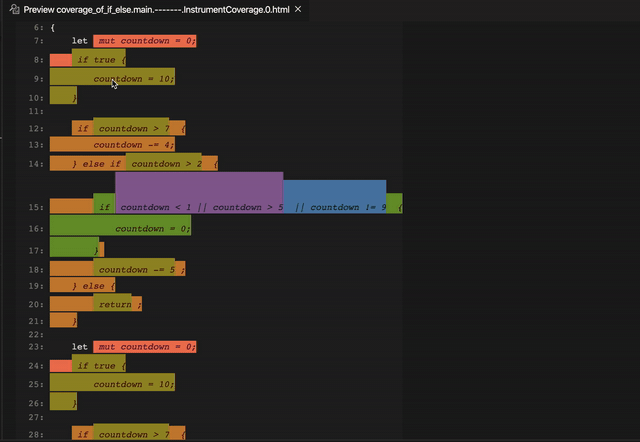Upgrade Chalk to 0.21
Two commits here. First commit actually does the upgrade. Second commit has some changes to make more tests in compare-mode=chalk pass.
The `PlaceholdersCollector` and `RegionsSubstitutor` bits are bit a hacky, but only insomuch as `ParamsSubstitutor` is. These won't be needed eventually.
r? @nikomatsakis
BTreeMap: introduce marker::ValMut and reserve Mut for unique access
The mutable BTreeMap iterators (apart from `DrainFilter`) are double-ended, meaning they have to rely on a front and a back handle that each represent a reference into the tree. Reserve a type category `marker::ValMut` for them, so that we guarantee that they cannot reach operations on handles with borrow type `marker::Mut`and that these operations can assume unique access to the tree.
Including #75195, benchmarks report no genuine change:
```
benchcmp old new --threshold 5
name old ns/iter new ns/iter diff ns/iter diff % speedup
btree::map::iter_100 3,333 3,023 -310 -9.30% x 1.10
btree::map::range_unbounded_vs_iter 36,624 31,569 -5,055 -13.80% x 1.16
```
r? @Mark-Simulacrum
Respect `-Z proc-macro-backtrace` flag for panics inside libproc_macro
Fixes#76270
Previously, any panic occuring during a call to a libproc_macro method
(e.g. calling `Ident::new` with an invalid identifier) would always
cause an ICE message to be printed.
Issue #74616 tracks a backwards-compatibility hack for certain macros.
This has is implemented by hard-coding the filenames and macro names of
certain code that we want to continue to compile.
However, the initial implementation of the hack was based on the
directory structure when building the crate from its repository (e.g.
`js-sys/src/lib.rs`). When the crate is build as a dependency, it will
include a version number from the clone from the cargo registry (e.g.
`js-sys-0.3.17/src/lib.rs`), which would fail the check.
This commit modifies the backwards-compatibility hack to check that
desired crate name (`js-sys` or `time-macros-impl`) is a prefix of the
proper part of the path.
See https://github.com/rust-lang/rust/issues/76070#issuecomment-687215646
for more details.
Disable zlib in LLVM on Haiku
PR #72696 enabled the option LLVM_ENABLE_ZLIB for the LLVM builds. Like NetBSD and aarch64-apple-darwin (see PR #75500), the LLVM build system not explicitly linking to libz on these platforms cause issues. For Haiku, this meant the runtime loader complaining about undefined symbols..
- Preserve suffixes when displaying
- Rename test file to match `intra-link*`
- Remove unnecessary .clone()s
- Improve comments and naming
- Fix more bugs and add tests
- Escape intra-doc link example in public documentation
Tools, tests, and experimenting with MIR-derived coverage counters
Leverages the new mir_dump output file in HTML+CSS (from #76074) to visualize coverage code regions
and the MIR features that they came from (including overlapping spans).
See example below.
The `run-make-fulldeps/instrument-coverage` test has been refactored to maximize test coverage and reduce code duplication. The new tests support testing with and without `-Clink-dead-code`, so Rust coverage can be tested on MSVC (which, currently, only works with `link-dead-code` _disabled_).
New tests validate coverage region generation and coverage reports with multiple counters per function. Starting with a simple `if-else` branch tests, coverage tests for each additional syntax type can be added by simply dropping in a new Rust sample program.
Includes a basic, MIR-block-based implementation of coverage injection,
available via `-Zexperimental-coverage`. This implementation has known
flaws and omissions, but is simple enough to validate the new tools and
tests.
The existing `-Zinstrument-coverage` option currently enables
function-level coverage only, which at least appears to generate
accurate coverage reports at that level.
Experimental coverage is not accurate at this time. When branch coverage
works as intended, the `-Zexperimental-coverage` option should be
removed.
This PR replaces the bulk of PR #75828, with the remaining parts of
that PR distributed among other separate and indentpent PRs.
This PR depends on two of those other PRs: #76002, #76003 and #76074
Rust compiler MCP rust-lang/compiler-team#278
Relevant issue: #34701 - Implement support for LLVMs code coverage
instrumentation

r? @tmandry
FYI: @wesleywiser
Move:
- `src\test\ui\consts\const-nonzero.rs` to `library\core`
- `src\test\ui\consts\ascii.rs` to `library\core`
- `src\test\ui\consts\cow-is-borrowed` to `library\alloc`
Part of #76268
diagnostics: shorten paths of unique symbols
This is a step towards implementing a fix for #50310, and continuation of the discussion in [Pre-RFC: Nicer Types In Diagnostics - compiler - Rust Internals](https://internals.rust-lang.org/t/pre-rfc-nicer-types-in-diagnostics/11139). Impressed upon me from previous discussion in #21934 that an RFC for this is not needed, and I should just come up with code.
The recent improvements to `use` suggestions that I've contributed have given rise to this implementation. Contrary to previous suggestions, it's rather simple logic, and I believe it only reduces the amount of cognitive load that a developer would need when reading type errors.
-----
If a symbol name can only be imported from one place, and as long as it was not glob-imported anywhere in the current crate, we can trim its printed path to the last component.
This has wide implications on error messages with types, for example, shortening `std::vec::Vec` to just `Vec`, as long as there is no other `Vec` importable from anywhere.